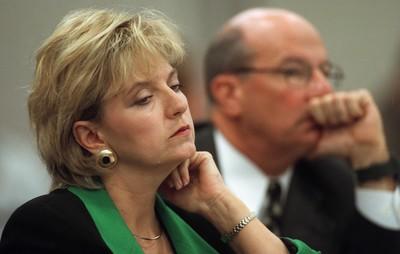Spirited Kenny offered promise
Few government watchdogs will forget the 1996 Clark County Commission meeting when a relative newcomer named Erin Kenny shook a set of pom-poms to encourage her fellow board members to discuss good news in their respective districts.
Kenny was a young, lively politician seemingly eager to please her constituents.
"She was very energetic and personable," Clark County Commissioner Bruce Woodbury said Thursday. "She wanted to be a team player is what she was telling everybody; she wanted to work for the good of the community."
"At one time, I really thought Erin stood for something and she was passionate about issues," said former Clark County Manager Thom Reilly. "It's painfully evident she didn't. It was all about her own self-interest and what she could get out of it."
Kenny's once-promising political career plummeted, hitting rock bottom in 2003 when she landed in a federal courtroom pleading guilty to political corruption.
As recently as last fall, Kenny was still a cheerleader, at her son's Meadows School football team games. But she sat high in the bleachers --alone and away from the rest of the parents. In her political heyday, she strutted the sidelines in power suits, chatting on her cell phone.
Kenny said last year that because of the community's contempt toward her, she has been in "public jail" since she admitted to pocketing cash bribes from strip club owner Michael Galardi.
During the last four years, she has worked to help federal prosecutors take down her former colleagues and, most recently, real estate consultant Donald Davidson.
Kenny testified against Mary Kincaid-Chauncey and Dario Herrera, who were convicted of also taking bribes from Galardi. She also took the stand in Davidson's trial, telling jurors that she collected $3,000 a month for three years after voting in 2000 for a casino in the Spring Valley neighborhood. She explained that Davidson bought her vote in favor of a CVS Pharmacy opposed by residents near the Buffalo Drive and Desert Inn Road site.
Woodbury noticed a change in Kenny's attitude toward her constituents during her tenure.
"The relationships were much too tight, allegiances were more toward special interests than to the public," Woodbury said of Kenny. "But I never imagined there were bribes or corruption to that extent."
Her admission that she accepted hundreds of thousands of dollars in bribes helped answer questions that had been swirling for years about Kenny appearing to live beyond her means.
Kenny was paid $54,000 a year as a commissioner and her husband, John, worked as a part-time chiropractor. Yet despite having five children, the couple managed to live what appeared to be a lavish lifestyle.
Constituents and fellow commissioners wondered how she could afford to sent her five children to Meadows School, where tuition ranges from $11,000 to $14,000 a year depending on the grade level.
She raised eyebrows when she purchased a $869,000 home a year after she signed her plea agreement with the government.
She sent a buzz through the community when she announced this month that she is paid $16,800 a month by developer Jim Rhodes to serve as his government services consultant.
In 1960, Erin Leigh Callin was born in Pasadena, Calif., into a politically active family. At a young age, Kenny and her parents moved to Wood Dale, Ill., a suburb of Chicago.
Her grandparents emigrated from Yugoslavia and instilled in their granddaugher that living in a democratic system in a privilege, Kenny said during a 1999 interview
Kenny's mother, a teacher and president of a Chicago public school teacher's union, was a staunch Democrat. Before age 10, Kenny helped her mother with political campaigns by making door hangers for fliers.
Her father, Charles Callin, worked as a draftsman for a local railroad company.
Kenny received a degree in speech communications from the University of Illinois, Urbana, in 1982. She then married John Kenny.
In 1985, Kenny launched her own advertising company called Callin and Callin Communications. Three years later, she filed for Chapter 7 bankruptcy, according to Illinois bankruptcy court reports.
The Kenny family which now included two young children, decided to move west in 1989. They packed up their car and took a road trip to explore a different part of the country. During a short visit in Las Vegas, Kenny hit a $600 jackpot. That same year, they chose to make Las Vegas home, Kenny has said.
Kenny worked the graveyard shift at Imperial Palace to help support her young family, which eventually expanded to five children. She opened her own advertising company in 1989, but the venture only lasted two years.
Kenny overcame a Republican advantage and won her bid for state Assembly in 1992. After her first two-year term, she set her sites higher: the Clark County Commission, considered the most powerful government body in Nevada.
Hints of Kenny's ruthlessness surfaced in her competitive campaign against incumbent Don Schlesinger. Anonymous fliers hinting that Schlesinger was gay appeared on the doorsteps of voters in District F. Kenny went on to win the race.
In 1998, as Kenny fought to retain her seat, she shattered campaign contribution records for county politicians, raising about $1.2 million.
She graduated from the Boyd Law School at UNLV while serving as a commissioner, but she subsequently failed the state bar exam.
During her second, and last, term on the board, Kenny frequently clashed with her colleagues and voted in favor of projects her constituents opposed.
"It was gradual," Woodbury said of the change in Kenny's behavior. "It seemed little by little over the years you had a sense she was more and more involved with developers. She seemed to enjoy very much being associated with the so-called influential people.
"You had a distinct feeling she was doing the bidding of the movers and shakers. She liked to be very friendly with those people and hang out with them and go to parties and events more than you'd think would be appropriate."
In early 1999, Kenny assisted the Culinary union in writing an ordinance that would keep Wal-Mart Supercenters from opening in the county. She carefully crafted the ordinance to prohibit big-box stores larger than 110,000 square feet with a percentage of space reserved for groceries.
The ordinance was overturned after Wal-Mart representatives challenged it in court.
She was accused of heavy-handed governing when she attempted to push through ordinances outlawing motorists' use of hand-held cell phones and prohibiting car lots from selling new cars on Sundays.
She faced a backlash from her fellow commissioners when she went behind their backs and developed a plan to build a $100 million children's hospital. Kenny sprung the proposal on commissioners during a board meeting, putting them in a tough spot politically.
Kenny's constituents began questioning her intentions as early as 1999.
"I don't think she truly 100 percent cares about residents," Theresa Bunker, then-president of the Enterprise Homeowners Association, said that year. "Making money and being noticed is her agenda."
Kenny was pulled before the Nevada State Ethics Commission in April 2001 after she was accused of directing two county employees to break into the County Government Center to find documents damaging to her colleague, Mary Kincaid, who changed her name to Kincaid-Chauncey after marrying.
Kincaid was in a heated race against Kenny's close friend, North Las Vegas City Councilwoman Stephanie Smith, to keep her commission seat.
The ethics board ultimately cleared Kenny of wrongdoing.
In May 2002, on the deadline for filing for her third term on the Clark County Commission, Kenny instead threw her name into the lieutenant governor's race.
Kenny even won the support of Sen. Harry Reid, D-Nev., who in 2002 told the Review-Journal: "The thing I most admire about Erin is that she's a person who does what she thinks is right. She may not always follow what is popular at the time. She has a fixed set of principles and off she goes."
During her unsuccessful campaign against incumbent Lorraine Hunt, Kenny was asked about her series of controversial proposals she pitched as a commissioner. Kenny simply answered: "People know who I am."
But did they?
Woodbury and Reilly said Kenny was more out of control toward the end of her term.
"After the election in 2002, I made some comments to people, to staff and one or two commissioners that it looks like we're having a fire sale on the county," said Woodbury, who has served on the commission for 25 years. "There were zone changes and variances that made no sense whatsoever. I thought it was just her way of saying thank you to some of her buddies in the development industry."
On May 14, 2003, FBI agents stormed into Galardi's Cheetah's topless bar and began seizing records from the strip club mogul's office. That same day, agents visited Kenny at her husband's chiropractic office.
The next day, Kenny met with federal investigators and admitted to receiving thousands of dollars from Galardi in exchange for votes in favor of his business empire. Those interviews with FBI agents are foggy, Kenny said last year.
"I was fairly distressed," she told jurors in the Herrera and Kincaid-Chauncey trial. "I was ashamed and remorseful."
Kenny told investigators that a bout with vertigo in 2000 had stolen most of her memory. Her former colleagues and staff members recall Kenny's long absence, but said she never mentioned memory loss.
Despite her spotty memory, the government made Kenny its star witness.
She soon explained that not only did she pocket Galardi's money, but she withdrew money from her campaign coffers for her own personal use, which was illegal, and sold her vote to Davidson.
Kenny told jurors that after Davidson paid her $200,000 to vote for zoning changes and special use permits that paved the way for a CVS Pharmacy her accountant and Davidson's son, Lawrence Davidson, established an off-shore bank account in the Cook Islands to hide her illegal payoff. Kenny testified that she was unaware of the details of the account.
"I didn't want to know," Kenny explained. "It was such a bad thing, I refused to look at it deeply. It wasn't how I was raised and it wasn't what I should have done."
Although some community members did not hide their disdain for the former representative, the government appeared to show sympathy toward Kenny. During her first day of testimony last year, she was escorted in through a back door typically reserved for federal employees in an attempt to avoid a barrage of reporters waiting at the front door.
Kenny said last year she believes she has done her time for her crimes.
"I've served three years in public jail," Kenny testified. "It's been very difficult. I felt terrible and ashamed and immediately apologized to the FBI."
Residents in her former district are still waiting for their apology.
POLITICAL CORRUPTIONGalardi InvestigationNews Archive
ON THE WEB Erin Kenny slideshow


















